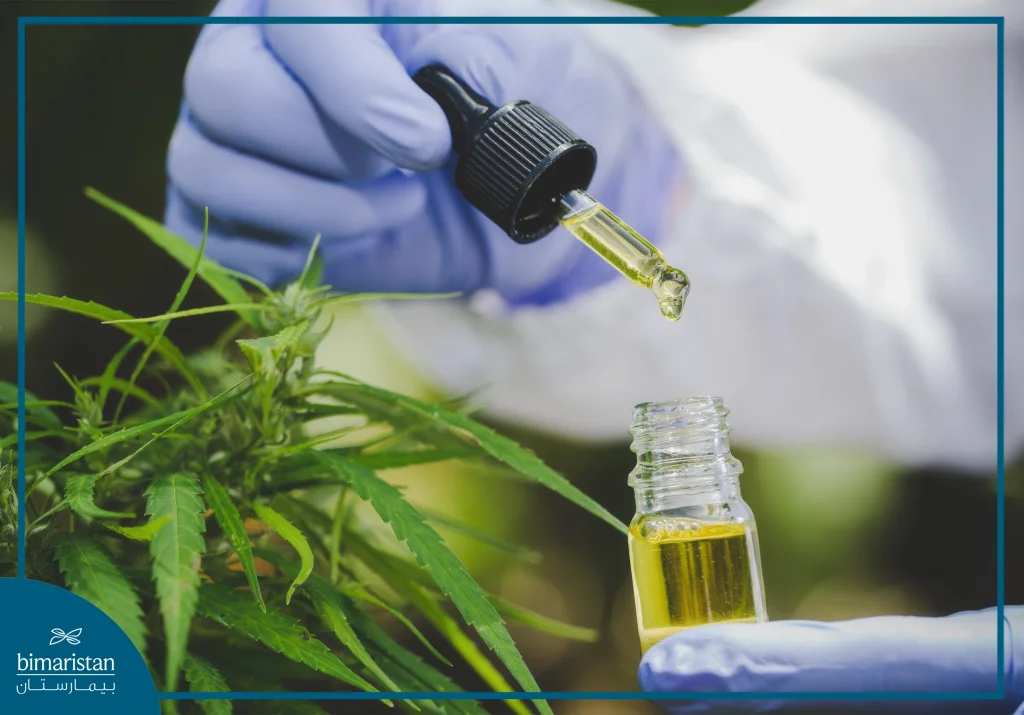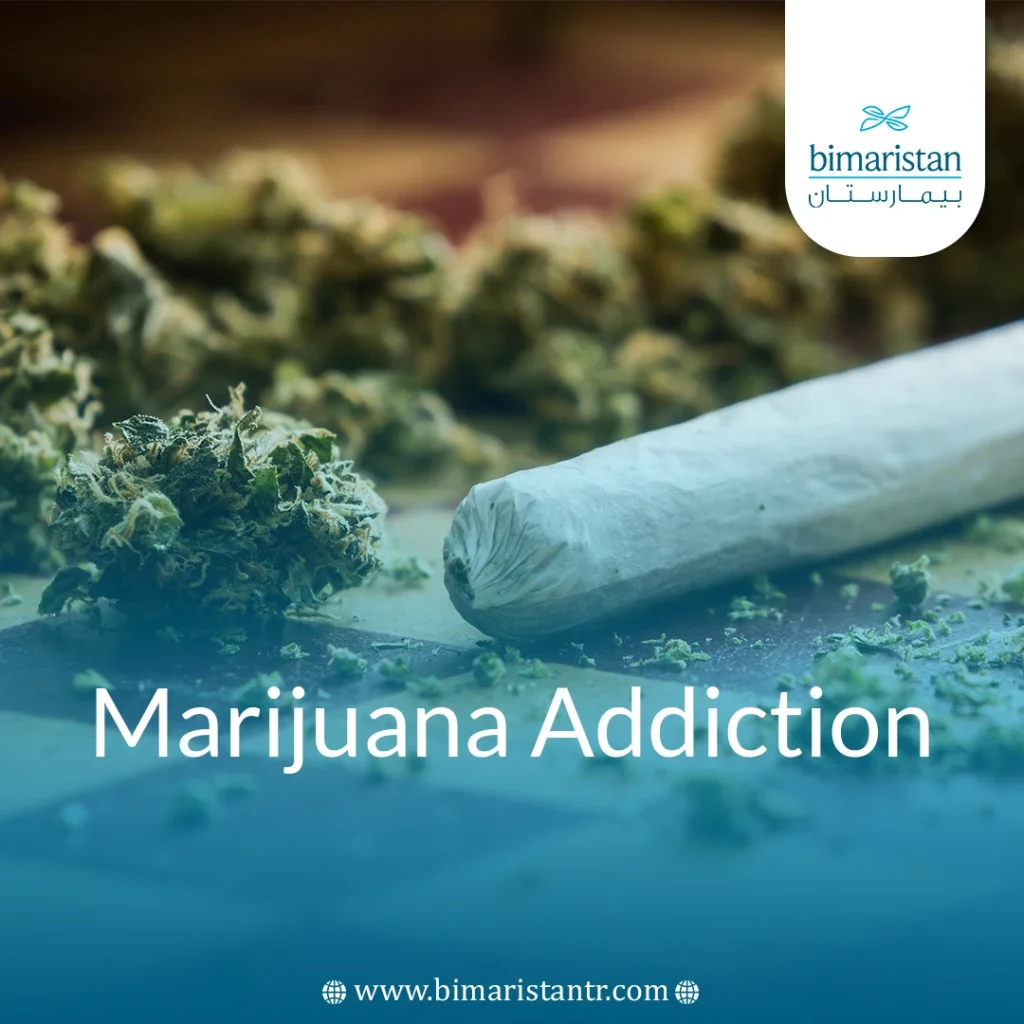Cannabis addiction these days has become one of the health and psychological issues that occupy the attention of many individuals and societies, as cannabis contains many biologically active compounds whose excessive use can lead to negative consequences on mental and physical health, and cannabis is the most consumed illicit drug in the world despite its disadvantages, as the number of consumers reached about 166 million annually (equivalent to 3.9% of the world’s population aged 15–64 years). Therefore, it is necessary to stay away from cannabis addiction and pay attention to treating the resulting complications as soon as possible.
What is Cannabis, and how does it lead to addiction?
Cannabis addiction is linked to the cannabis sativa plant, which contains more than 500 chemicals, mainly pure cannabidiol (CBD) and tetrahydrocannabinol (THC) that cause a feeling of euphoria. Excessive or repeated marijuana use leads to a mental health condition called Cannabis Use Disorder (CUD), during which a person feels an overwhelming desire to use cannabis and an increased tolerance with or without withdrawal symptoms when they stop using it, causing psychological distress and negatively affecting their quality of life.
Cannabis addiction is the most severe form of marijuana (cannabis) use disorder, which can be mild, moderate, or severe. Cannabis addiction occurs when the brain’s reward system takes over and increases the compulsive desire to use it, and the person becomes unable to stop using cannabis even though it causes many health and social issues in his or her life.
About 3 in 10 people who use cannabis have a cannabis use disorder (Marijuana addiction) and it is estimated that people who use cannabis have a 30% chance of becoming addicted.

How does Cannabis affect the brain and nervous system?
Cannabis addiction affects brain development, as it directly impacts the parts of the brain responsible for memory, learning, attention, decision-making, coordination, emotions, and reaction speed, and there are two types of effects of cannabis addiction on the brain:
- Short-term effects: It directly affects thinking, attention, memory, coordination, and time perception within 24 hours, especially in adolescents and young adults.
- Long-term effects: It impacts brain development. Developing brains (those of infants, children, and adolescents) are particularly vulnerable to the harmful effects of cannabis addiction and THC because the brain continues to develop until around age 25, and maternal cannabis use during pregnancy may be associated with issues with attention, memory, problem-solving skills, and behavior in their children. Cannabis addiction’s effects on attention, memory, and learning may be long-lasting or permanent, but more research is needed to fully understand these effects.
Cannabis (Marijuana) as medicine
The U.S. Food and Drug Administration (FDA) has approved a single cannabinoid drug called Epidiolex, which contains CBD, to treat seizures in two rare forms of epilepsy, Lennox-Gastaut syndrome and Dravet syndrome. It is also used to treat seizures associated with tuberous sclerosis complex, a rare genetic disorder.
It also approved two other drugs made from a chemical similar to THC found in cannabis, Dronabinol and Nabilone, which are useful in treating nausea in cancer patients as well as to increase appetite in AIDS patients, these drugs are available only by prescription and there are no other approved uses for cannabis or its derivatives from the US Food and Drug Administration (FDA).
Causes and factors leading to Cannabis addiction
Cannabis addiction often progresses from experimental use, occasional use, heavy use, and finally cannabis use disorder and cannabis addiction. This progression is very complex, with several factors contributing to it, including:
- The effect of tetrahydrocannabinol (THC) on the brain: Human beings, by nature, seek rewards that often come from healthy behaviors. For example, when spending time with a loved one or eating a delicious meal, the body releases dopamine, which gives a feeling of happiness and turns into a cycle, just as it happens when repeating cannabis use, where the patient seeks to repeat the use of cannabis because it causes positive feelings.
- Mental health issues: About 50% of people with a mental health condition, such as depression, also have a substance use disorder, and vice versa. This condition is called dual diagnosis and is caused by several overlapping factors such as issues in similar areas of the brain, genetic vulnerability, and environmental influences.
- Genetics: Genetic factors are responsible for between 40% and 60% of the likelihood of developing a substance use disorder (a mutation in the CHRNA2 gene on chromosome 8 is associated with substance use disorder).
- Cannabis access and exposure: Access to cannabis is a critical environmental risk factor.
- Gender: Males are more likely to develop cannabis addiction.
- Mental health disorders: Cannabis addiction is more likely to occur when a mental disorder, such as depression, ADHD, or PTSD, is present.
- Use of highly addictive substances: The use or abuse of certain drugs, such as stimulants, cocaine, or opioid painkillers, can lead to more rapid cannabis addiction than other drugs.
- Influence of surrounding people: This is one of the key factors for initiating cannabis use and cannabis addiction, especially in adolescents.
- Starting at a young age: Cannabis use is more likely to develop into cannabis addiction when starting at a young age because it may cause changes in the brain.
- Lack of parental attention, intimacy with parents, and monitoring of their children increases the likelihood of cannabis addiction.
- Smoking and injecting drugs can increase susceptibility to cannabis addiction.
- Family history of cannabis addiction.
Psychological and physical symptoms of Cannabis addiction
Some of the signs and symptoms of cannabis use disorder and cannabis addiction include cravings for cannabis, trying unsuccessfully to quit, giving up important activities with friends and family to use cannabis, and continuing to use cannabis despite physical or psychological issues. These are early warning signs of cannabis addiction. Psychological and physical symptoms of cannabis addiction include:
- Chronic bronchitis (occurs when smoking or vaporizing marijuana)
- Experiencing cannabis withdrawal symptoms, which can be relieved by consuming more cannabis
- Sleep disturbance and time perception disorder
- Anxiety, fear, distrust, panic, or hallucinations
- Impaired thinking, memory issues, and learning difficulties
- Sudden swings in mood and behavior
- Cannabis-induced hyperemesis syndrome
- Fertility issues
- Psychosis
Cannabis and cancer
There are studies on marijuana (cannabis) and its cannabinoid compounds (such as tetrahydrocannabinol or cannabidiol ) to control the side effects of cancer and its treatments (such as chemotherapy), the results indicate that there are some marijuana compounds that can help alleviate some of these side effects, however, it has not yet been proven that cannabis or its compounds can cure cancer. Cannabis therapy can cause many side effects and complications. Avoiding or delaying conventional medical cancer care or relying on cannabis (marijuana) alone to treat or manage the effects of cancer can lead to serious health consequences.
Does cannabis cause cancer?
Smoked cannabis introduces THC and some harmful substances, such as many toxins and carcinogenic chemicals found in tobacco smoke, which harm the lungs and cardiovascular system, and more research is needed to understand the potential effects of cannabis on lung cancer and other respiratory cancers. However, limited evidence has been documented to date of an association between current, frequent, or chronic cannabis smoking and testicular cancer (cancer of the non-sperm cells).
Diagnostics and examinations
How is cannabis use disorder and addiction diagnosed?
To diagnose cannabis addiction (marijuana use disorder), a thorough assessment of the patient’s medical history and cannabis-related behaviors must be relied upon, drug testing may also be required, and it is important to ask about the patient’s mental health history as it is common for cannabis addiction to co-occur with a psychiatric condition.
According to the Diagnostic and Statistical Manual of Mental Disorders (DSM-5) of the American Psychiatric Association, a diagnosis of cannabis addiction (cannabis use disorder) requires a person to exhibit at least two of the above symptoms for more than 12 months, and cannabis addiction is categorized into different severities:
- Mild cannabis addiction: Two to three signs.
- Moderate cannabis addiction: Four or five signs.
- Severe cannabis addiction (marijuana addiction): Six or more signs.
Cannabis addiction treatment methods: Effective programs and techniques
The development of effective treatment programs for cannabis (marijuana) addiction is necessary due to the increasing strength and accessibility of cannabis strains, the continuous increase in marijuana use and the high rate of addiction resulting from it, so the treatment of cannabis use disorder often requires continuous care to ensure successful treatment as it is a chronic condition with the possibility of recovery and relapse, and since people with cannabis (marijuana) use disorder often suffer from concomitant psychiatric conditions, treating them together is generally better than treating them together.
Steps of psychological and behavioral treatment for Cannabis addiction
Effective treatment involves two main steps:
Detoxification
The first major step in the treatment of Cannabis addiction is to stop using marijuana, and depending on the severity of the case, the dose is gradually reduced to ease the effects of withdrawal, unlike abrupt cessation, gradual reduction is more likely to alleviate the effects of withdrawal symptoms and prevent relapse, and supportive care such as providing a calm and non-stimulating environment plays an important role in the treatment of marijuana addiction.
Cannabis intoxication does not require medical care in most cases and heals spontaneously, yet there is still research on the use of pharmacotherapy for detoxification, and the US Food and Drug Administration has not approved any medication for the treatment of cannabis use disorder. In some cases, tetrahydrocannabinol (THC) may help, but more information is needed to validate it and determine the dosage, duration, composition, and adjunctive therapies. Gabapentin and N-acetylcysteine can also be used, but their benefits are not yet clear. Cannabidiol (another component of cannabis) is a promising drug being developed by modulating the serotonergic, glutamatergic, and endocannabinoid systems.
Cognitive and behavioral therapies
Research shows that behavioral interventions can be effective in treating cannabis use disorder and marijuana addiction. There are currently no FDA-approved medications for treating cannabis use disorder or for medically assisted withdrawal, but research is ongoing. Some examples of effective treatments for adults with cannabis use disorder include:
- Cognitive Behavioral Therapy (CBT): CBT is a structured, goal-oriented psychotherapy in which the addict is helped to review their thoughts and feelings. It is useful in eliminating negative thoughts and behaviors and building healthy patterns and habits of thinking.
- Dialectical Behavior Therapy (DBT): This therapy is particularly effective for people who have difficulty managing and regulating their emotions, and has been shown to be effective in the treatment and management of various mental health conditions, including borderline personality disorder.
- Affirmative Community Treatment (ACT): This therapy provides mental health services in a community setting rather than a residential or hospital setting, and is characterized by its individualized nature, in which the treatment plan focuses on the patient’s strengths, needs, and future goals.
- Therapeutic Communities (TCs): A long-term residential treatment focused on helping people with chronic substance use disorder develop new and healthier values and behaviors related to substance use and other co-occurring mental health conditions.
- Contingency Management (CM): Contingency management encourages healthy behaviors by offering rewards for desirable behaviors. For example, treatment provides a monetary reward for people with chronic cannabis (marijuana) use disorder to motivate them to quit using cannabis, and when a negative drug test (e.g., cannabis) comes back negative, the person has a chance to receive a prize or gift card.
- Participation in self-help programs, such as Marijuana Addicts Anonymous, is also helpful in treating chronic cannabis use disorder and marijuana addiction.

Support and connection with family members are key components of addiction recovery. Research suggests that the size, function, and quality of social support networks are directly related to positive indicators of mental health, effective coping strategies, and overall quality of life. Conversely, the loss or interruption of personal social relationships due to mental illness or addiction may hinder recovery from marijuana addiction.
Family support plays a critical role in various areas of marijuana addiction recovery, including personal confidence, hope, and goal-orientation, which promote self-esteem and self-worth. Furthermore, involving family members in the treatment approach and family therapy is an essential component of effective mental health care, as it promotes recovery, alleviates symptoms, and lowers the overall cost of marijuana addiction treatment.
The importance of support groups and participation in addiction treatment programs
Support groups are the process of giving and receiving non-professional help from individuals with similar circumstances, helping in recovery from mental health issues and drug addiction (e.g., Cannabis addiction). These groups are very effective in treating addiction, especially when combined with medical treatment. Support groups help treat addiction by:
- Learning new skills: Listening to how others face difficulties promotes the learning of new skills.
- To stay motivated: Having a group that shares challenges and successes motivates individuals to keep going.
- Realism in recovery: Remind individuals of the realities of recovery and motivate them to learn how to cope with challenges.
- Share stories and tips: Providing coping strategies based on personal experiences
- Emphasize that the individual is not alone and provide support and encouragement in a confidential and free environment
- Relapse prevention: Provides support for relapse prevention and encourages self-care.

Challenges facing the addict in recovery
There are many challenges, including:
- Developing new coping strategies: Recovering from addiction is not only about stopping the use of drugs (marijuana), but also about building a new lifestyle that supports recovery and prevents relapse. Developing new coping strategies to manage stress, anxiety, and cravings is an essential part of this process. It’s difficult and time-consuming, but it’s worth it.
- Addressing trauma and shame without resorting to drugs and alcohol: This is a major challenge for recovering addicts, as many of them used to use these substances to deal with negative emotions, such as trauma and shame. During rehabilitation, they struggle to deal with these emotions without resorting to addictive substances, and it takes a lot of effort, time, and courage to confront these emotions and address the root causes of addiction.
- Building new relationships and repairing old ones: Building relationships and social networks that provide love, support, friendship, and hope is an essential part of life in recovery. Addicts are challenged to build new relationships with their peers in recovery. This process can take weeks, months or even years and is never easy, however, it plays an important role in breaking free from the old life of addiction and adopting a long-term recovery approach to addiction.
- Boredom: After completing a rehab program and returning home, a recovering addict may experience boredom. Boredom is one of the most common addiction recovery challenges and can be a major threat to recovery, because previously the addict used to spend most of their free time using drugs and alcohol, but now that these things are no longer in their lives, they will need to learn how to utilize their time in other ways, such as sports.
- Relapse: Relapse prevention is one of the biggest challenges many face in addiction recovery during and after rehab, as cravings, stress, anxiety, and old acquaintances pose potential threats when trying to commit to marijuana sobriety.
Preventing relapse after Cannabis addiction treatment
Marijuana relapse prevention is an essential part of recovery, as the risk of relapse remains even after abstinence, and can be prevented by:
- Dealing with setbacks: Understand that a setback can be part of recovery and deal with it positively
- Staying away from stress and learning how to manage stress in healthy ways
- Focusing on physical health and sticking to the treatment plan
- Set realistic goals to stay motivated
- Self-development and improving mental health
- Recognize and avoid triggers
- Joining support groups
- Communicating with a psychiatrist
Cannabis withdrawal symptoms
After stopping cannabis use, a person may experience withdrawal symptoms, such as anger, irritability, aggression, feelings of tension or anxiety, loss of appetite or weight, depression, insomnia, strange dreams, headaches, sweating, abdominal pain, and tremors. These symptoms may last from one to two weeks.
How to deal with Cannabis withdrawal symptoms
There are no serious complications that require hospitalization, and medications such as zolpidem or buspirone may be useful for occasional treatment, but so far, no specific medications have been proven to be effective in treating cannabis withdrawal symptoms. Psychotherapy, such as cognitive behavioral therapy (CBT), should also be adhered to, and some tips for dealing with symptoms include:
- Reduce sugars and junk food
- Getting enough rest and sleep
- Access to social support
- Exercise
- Eating a varied diet
- Drink plenty of water
Conclusion
In conclusion, cannabis addiction is a health and mental health issue that affects many people around the world. It is essential that the symptoms and risk factors of cannabis addiction are recognized and that appropriate treatment and support are provided. Psychological and behavioral therapies, as well as ongoing support groups, go a long way in helping individuals recover. Through ongoing education and treatment resources, we can help people overcome cannabis addiction and live healthier, more fulfilling lives.
Sources:
- National Institute on Drug Abuse. (n.d.). Cannabis (marijuana) research topic
- Centers for Disease Control and Prevention (2025, March 7). About prescription opioids. Centers for Disease Control and Prevention
